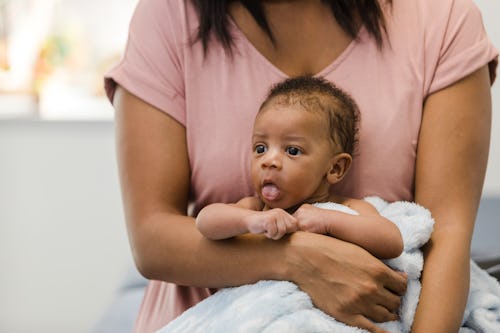
Summer may be in full swing, but cold and flu season is only a few months away, bringing coughing, sneezing, sniffling, and, for some little ones, the dreaded Respiratory Syncytial Virus more commonly known as RSV. While almost all children will contract RSV by time they’re 2, according to the Centers of Disease Control and Prevention (CDC), up to 80,000 children under 5 are hospitalized with the virus annually. But today, the U.S. Food and Drug Administration (FDA) approved Beyfortus, a monoclonal antibody that can prevent RSV in toddlers and infants. Though this approval is just the first step in total approval, the CDC’s Advisory Committee on Immunization Practices will meet next month to issue their own recommendations.
RSV is a lower respiratory tract disease. Symptoms in children include runny nose, decreased appetite, coughing, sneezing, irritability, and sometimes a fever. While the vast majority of cases pass without incident, for some young children and the elderly, it can be serious and even dangerous, leading to pneumonia and bronchiolitis. Those at greatest risk for severe illness from the virus include preemies, infants under 6 months old, children under 2 with co-morbidities such as lung or heart disease, and children with weakened immune systems.
Developed by AstraZeneca, Beyfortus is not a vaccine, but a monoclonal antibody. These laboratory-made proteins work by mimicking the immune system’s ability to fight off harmful pathogens such as viruses. The FDA says that one dose of Beyfortus (given as an injection) prior to RSV season may provide significant protection during the course of the season, which typically begins in fall before peaking in the winter, according to the CDC.
Development of this treatment (called nirsevimab-alip generically) was fast-tracked after a disconcerting surge of RSV-related hospitalizations last year, particularly among very young children and the elderly. Safety was evaluated in three different trials involving nearly 4,000 children from preterm infants to toddlers up to 2 years old. While side effects were observed, they were rare and mild, and the FDA determined that treatment can be beneficial to newborns and infants born during or entering their first RSV season, and in children up to 24 months of age who remain vulnerable to severe RSV disease.
“RSV can cause serious disease in infants and some children and results in a large number of emergency department and physician office visits each year,” John Farley, M.D., M.P.H., director of the Office of Infectious Diseases in the FDA’s Center for Drug Evaluation and Research, said in a statement. “Today’s approval addresses the great need for products to help reduce the impact of RSV disease on children, families and the health care system.”
0 comments:
Post a Comment